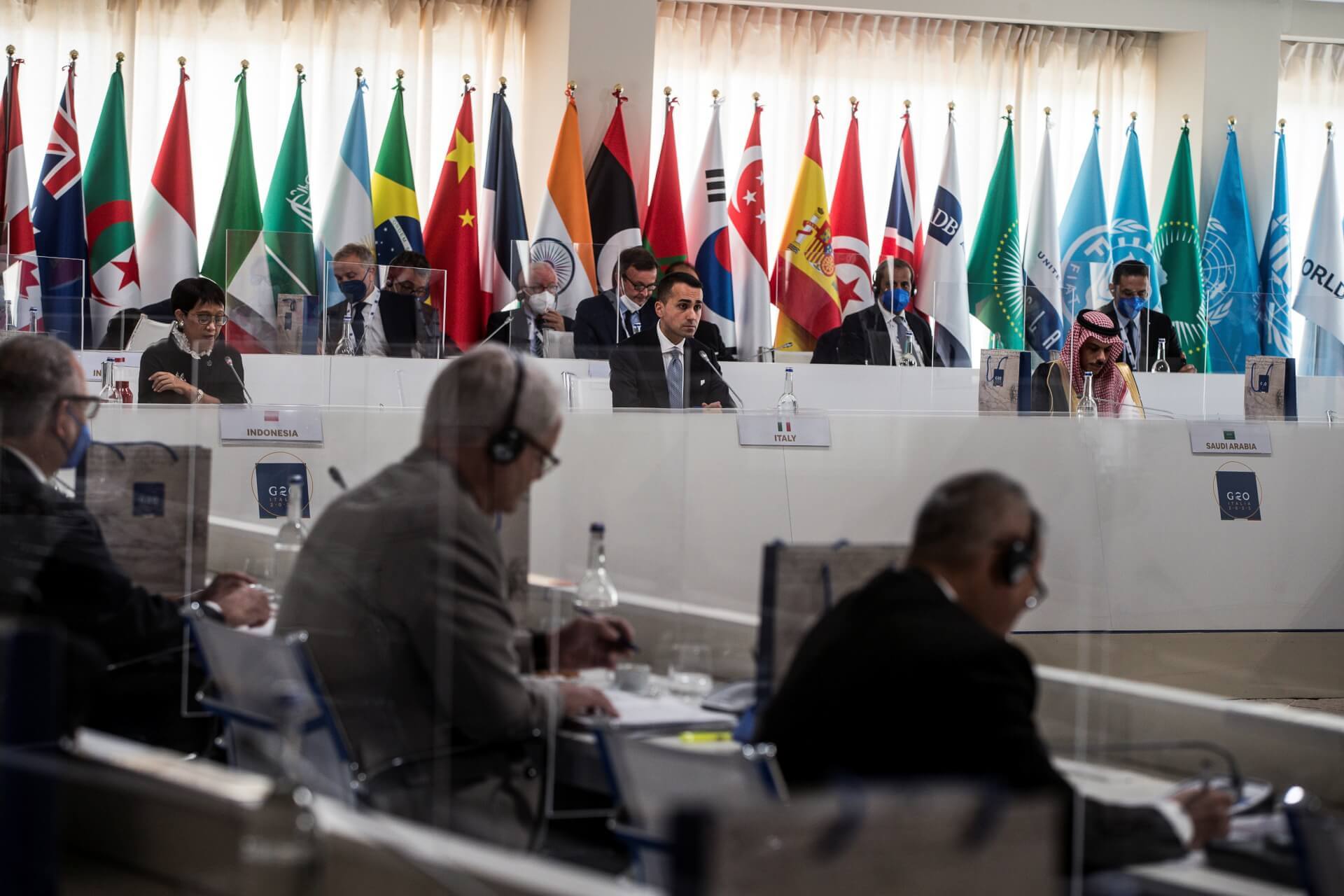On Tuesday, G20 foreign ministers met in Matera, Italy to discuss the COVID-19 pandemic, climate change, and facilitating sustainable development in Africa, among other topics. The foreign ministers of China, Brazil, and Australia participated virtually due to coronavirus-induced travel concerns and restrictions, while Russia and South Korea were represented by deputy ministers.
Italy currently holds the presidency of the grouping, which is made up of: Argentina, Australia, Brazil, Canada, China, Germany, France, India, Indonesia, Italy, Japan, Mexico, Russia, Saudi Arabia, South Africa, South Korea, Turkey, the United Kingdom (UK), the United States (US), and the European Union (EU). These countries account for a cumulative total of around 80% of the world’s GDP, 75% of global trade, and 60% of the global population.
Beginning the meeting, Di Maio described “multilateralism” and “international cooperation” as the “only effective instruments in facing global challenges.”
His thoughts were echoed by US Secretary of State Antony Blinken who said, “To bring the pandemic to an end, we must get more vaccine to more places,” adding, “Multilateral cooperation will be key to our collective ability to stop this global health crisis.” To this end, Blinken noted that the US had pledged to deliver 500 million doses of the Pfizer vaccine and 80 million doses of other vaccines through the World Health Organization’s (WHO) COVAX initiative.
Indian External Affairs Minister S Jaishankar also stressed on the need for “international cooperation.” He then made yet another call for the reform of international institutions and for decentralised globalisation, saying, “Institutional multilateralism has been found wanting. Reforms have many forms but vaccine equity will be the immediate test. The real economy needs decentralised globalisation, including in manufacturing, food and health. Resilient supply chains must develop in parallel.”
Along these same lines, German Foreign Minister Heiko Maas underscored the need for vaccine equity, saying, “I think the main thing now is to quickly create alternatives so that countries, regions like Africa, for example, are able to be supplied with more vaccine more quickly.” He appeared to put his weight behind proposals to remove patents or “introduce waivers” on vaccines and related products to achieve this goal.
While focusing on the pandemic, Di Maio also stressed that the pandemic could not be used as a pretext to ignore climate change, and declared that the Paris Climate Accords must be implemented. Keeping this in mind, Blinken said that the US is now an able and willing partner on this front, having re-joined the Accords under President Joe Biden. He remarked, “We believe major economies like those in the G20 should support developing economies to pursue economic growth in a green and sustainable way.”
The Italian minister also focused on food security, income inequality, “green and digital transitions”, and empowering women and youth in Africa, claiming that the G20 has a “duty to support Africa in getting out of this difficult period and into a phase of sustained and sustainable growth.”
In fact, Italy invited the Democratic Republic of Congo’s foreign minister, Christophe Lutundula, to take part in the meeting as an indication of the G20’s support for the African continent. Lutundula used the opportunity to call for “concrete help” that “moves beyond speeches to urgent action on the ground.”
Keeping this in mind, the G20 foreign affairs and development ministers released the “Matera Declaration on Food Security, Nutrition, and Food Systems.” The joint release talked about how the world is not currently on target to meet the goal of achieving zero hunger by 2030. In fact, the number of people “affected by hunger” could swell to 840 million by 2030, and possibly even more due to the ongoing pandemic. Therefore, the ministers came together to offered support for increased investment in agriculture and protecting agrobiodiversity. They also called for: “effective actions for the empowerment of women and youth in the rural-urban continuum”; “enhancing social-protection measures and programs”; “accelerating the adaptation of agriculture and food systems to climate change”; and “keeping international food trade open and strengthening global, regional, and local diversified value chains for safe, fresh, and nutritious food”.
Alongside universal issues, the meeting was also used to raise concerns about individual countries. German Foreign Minister Heiko Maas, for example, echoed recent statements by Chancellor Angela Merkel, saying, “When you get together, you also have to talk to each other. We need dialogue with Russia and China.”
SUMMARY: G20 Foreign Affairs Ministers’ Meeting
The ministers stressed on the need for international cooperation in order to put an end to the pandemic and carve out a new era in international relations.
June 30, 2021

IMAGE SOURCE: ANSA / ANGELO CARCONI VIA REUTERSThe G20 foreign affairs and development ministers issued a joint release detailing how the world is not currently on target to meet the goal of achieving zero hunger by 2030.
